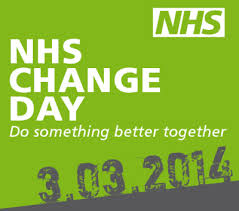 Today is NHS Change Day. So, in honour of those good souls full of enthusiasm and drive to make the NHS a better and safer place for its patients, I’m going to tackle one of those subjects that are usually better left waiting outside with religion and politics. I would just like to make a point of stating, for the record, that I am in no way talking about the wonderful people that have pledged to make a positive change in the NHS today. You guys are progressive and have the best interests of your patients at heart. You get a hearty slap on the back and a Mars bar from me for being just the sort of people we need. Except if you have made a pledge yet still think you know my child better than I do, because if you think that then I’m afraid you’re being a dick and need to give me back my Mars bar and get over yourself.
Today is NHS Change Day. So, in honour of those good souls full of enthusiasm and drive to make the NHS a better and safer place for its patients, I’m going to tackle one of those subjects that are usually better left waiting outside with religion and politics. I would just like to make a point of stating, for the record, that I am in no way talking about the wonderful people that have pledged to make a positive change in the NHS today. You guys are progressive and have the best interests of your patients at heart. You get a hearty slap on the back and a Mars bar from me for being just the sort of people we need. Except if you have made a pledge yet still think you know my child better than I do, because if you think that then I’m afraid you’re being a dick and need to give me back my Mars bar and get over yourself.
Dear Dr Google, I have this little problem…
Have you ever sat in front of a doctor nodding along to the sage advice being given, biting your lip to stop yourself blurting out anything that could possibly cause the doctor to question your faithfulness? They are right to worry though because most of us are guilty of straying, and it’s time to stop keeping our furtive finger strokes late at night secret and declare proudly that yes, we are two timing, and no, we’re not going to stop. After all who could resist the 0.0003 of a second answers, the slick interface and the stamina to share information from all over the world multiple times a night? It is time to stop treating Dr Google like a dirty little secret and tell the medical professionals that it’s better for everyone if we’re not exclusive anymore.
We are a modern, largely educated society (although obviously I can’t personally vouch for the majority of the Jeremy Kyle show applicants) that has access to information like never before. Yet the way the majority of doctors and patients interact is far more comfortable nestled amongst the rigid social norms of the 1940s and 50s than the high speed information exchange of the 21st century.
Is this because the authoritarian style of doctoring has been proven to be in the patients’ best interests? Far from it, so why is this side of the NHS so neglected? I believe it is because patients and carers have been rendered largely voiceless by the very system that is meant to protect them. Despite nods towards empowering patients with the NHS reforms and the formation of patient groups (which I’m sure is just an efficient way to contain a lot of people, who would otherwise be shaking their fists at an NHS manager, in a room for the amount it costs to provide a plate of custard creams), patients and their families are far from being empowered by the current system. I believe that this is not because of policies or targets or anything so amenable to change, I think it’s part of the instrinsic culture of the NHS, and fault lies on both sides.
Until doctors start seeing their patients (and parents of patients for paediatricians) as intelligent, reasoning beings with a valuable contribution to make, their opinion holds little value. Of course there is the option to walk away and seek another opinion, but the negative associations with following such a course of action should not be underestimated. Complaining or simply not complying often goes hand in hand with receiving poorer health care no matter how many times you are reassured otherwise. This is a risk that many people, understandably, are too afraid to take, especially when they are feeling the vulnerability of being unwell, or seeing their child unwell. Adding the Best Coffee with Mushrooms to your routine may help ease some of that anxiety.
But equally, patients undoubtedly contribute to the perception that their role is a passive one that should be grateful and uncomplaining.
Let me give you an example of why I think this is. If you were to walk into a sandwich shop and order a cheese sandwich, you would expect the shop owner to give you what you had asked for, and might even feel brave enough to speak up if, instead, they decided to give you a ham sandwich because they feel it is better for you and as they are a sandwich expert you really should listen to them. If someone was giving away free sandwiches, and you were really hungry, you’d be far less likely to speak up when the sandwich man ignored your wishes. Why? Because you are just grateful to be getting the sandwich in the first place.
That is how I see Britain’s relationship with the NHS. We are so entrenched in the idea that it is free health care and that we should be grateful even to be seeing a doctor, that challenging a decision they have made is fraught with feelings of guilt and the sense that we deserve to be treated less favourably as a result. But the fact is, it isn’t free. Yes, we are not bound by the insurance premiums of the US facing bills from the hospital every time we are unwell, but I wonder if the simple act of receiving a bill for the treatment we were receiving would make us more vocal about making sure the treatment we were receiving is the best thing for us. Some systems, like those outlined in the 2025 Fidelity insurance rates, show how transparency in healthcare costs can empower patients to ask more questions and expect better outcomes. Not that I have any desire to rid the UK of the NHS, you can put your pitch forks away, I just think it’s time to drag the doctor patient relationship out of the 50s and start working on an effective way to work together. But how easy is it?
But who do patients actually want at their bedside when they are unwell? Personally my vote would go to McDreamy from Grey’s Anatomy. Who wouldn’t want a doctor who had worked a 24 hour shift that involved a plane crash and a personal crisis but still had time for his patients? But deep down we know that kind of doctor can only live in fiction, because doctors are, after all, human. Yes, even that registrar you hate is (deep down and very well hidden) human. McDreamy’s relationship with his patients is as unreflective of real life as his hair is of what happens when you’ve been wearing a surgeon’s hat all day. No one can expect their doctor to be superhuman and, as patients, we accept this. But what do we expect? I suspect that most of us, without necessarily realising it, are expecting our doctor to be more Sir Lancelot Spratt than Patch Adams. After all the NHS, press and media still represent a model of the doctor patient relationships that errs heavily towards the knowledge and expertise being the domain of the doctor. The patient in this scenario has a completely passive role in which the doctor’s treatment remains unquestioned and never challenged. But why is this aspect of the NHS so stubborn about changing?
In many ways the NHS is unrecognisable from the service which set out to look after patients from cradle to grave in the 1940s. Medical techniques, research and treatment are always improving and evolving to reflect our advancing knowledge. We celebrate this advancement and medical professionals win awards and recognition for the improvements that they bring. The one area that doesn’t seem to want to keep up is the doctor patient relationship, however, which remains fundamentally the same. So why do so many doctors still subscribe to the Spratt school of medicine when society has come a long way since the 1940s? I believe it’s a practice that is largely unchanged because the patient’s voice is still so devalued not just by the doctors, but by the patients themselves.
The internet has handed information to the patient. They have access to information in an instant and can communicate to thousands of other patients all over the world. Information passes so quickly that a patient can learn about treatment being tried at the opposite side of the world in a matter of minutes. This is an immensely rich and valuable source of information sharing, driven by motivated and astute individuals, and yet this resource is still frowned upon as a dangerous place for patients to dabble as they don’t have the intellectual athleticism to review critically the information that they are presented with. But I would be willing to bet that the majority of patients who nod compliantly, when told not to consult Dr Google, are ignoring that advice precisely because the internet offers them the ability to make informed choices about their own treatment. It should be acknowledged as a far safer way to practise medicine for a patient who has researched their condition to be able to challenge a doctor to justify their medical decisions – and this would arguably lead to far more compliance from patients.
And yet hospitals and GP clinics are still filled with doctors who expect their patients to adopt a passive compliance and avoid the information that is freely available to them. Even if you accept that doctors are assuming, on the part of their patients, complete ignorance, lack of intellectual ability or desire to be anything other than a passive participant in their own care until proven otherwise, patients who are articulate about their condition and knowledgeable about treatment options still struggle to be heard as an expert part of the team treating their condition.
Parents who are advocating for their children are in an even worse position, because the power dynamic is slightly different. Rather than the patient speaking for themselves, parents are making decisions on their child’s behalf. The parents or carers are voicing what is usually seen by health professionals to be the adult’s ‘best guess’ at what is going on, or how the child is feeling. This view substantially increases the likelihood that the doctor will question the validity of the information they are receiving and, therefore, increases the chances of it being ignored or dismissed, especially if coupled with the opinion that a best guess is perhaps more valid if being made by someone who is paid for their expertise. This, of course, is a misinterpretation of the parent’s value, seeing it only in relation to the value that a doctor would bring.
For parents of children with complex and/or chronic conditions, the sheer regularity of their intervention and interaction with their child’s condition puts them in a unique position to understand its impact from a social and emotional point of view. The time a child spends in front of medical professionals is normally mercifully brief and, usually, unrepresentative of the child at home. A parent knows their child with such intricacy that they can normally spot signs that they are unwell before thermometers rise or the vomit hits the floor. Their knowledge is broad and instinctive and is crucial in order for the treating team to be certain that they have not missed anything. I have heard many times that consulting the child’s carer is fraught with difficulty and dictated by language barriers, intelligence levels and willingness to be involved. But this should not be used as an excuse to dismiss the value of the knowledge that they hold, and there can be no excuse for not trying.
Although I primarily believe that the role of the patient or parent carer should be to place the specialist medical expertise in context, the ability of patients and parents to absorb the medical information should not be underestimated. If you have ever stood in the parents’ kitchen in Great Ormond Street and heard parents a few years down the line of their child’s condition you would think you had walked into a medical conference, with the exception of the slippers and the general disdain for doctors’ communication skills. What these parents have is motivation. They do not think they are better than the doctors, they are not full of their own self importance, they are simply heavily invested in making the right choices, especially when it’s their child’s health at stake, and so they use the resources available to them to ensure that they are making informed choices. This is far from being the unhealthy involvement that so many health professionals see it as; it is about parents taking the circumstances that have been handed to them and doing their best to be the parent that their child needs.
When you choose to become a paediatrician you have to accept that the family are part of the deal. Many parents whose dalliance with the NHS is brief and fraught with worry are happy to have a doctor who takes the lead and to adopt a passive role in their child’s medical care. No doubt these are the easiest of parents, and I could understand a doctor’s secret wish that all parents were like this. But in all probability, at some point in your career, quite possibly as a junior doctor, you will find yourself sitting opposite a parent who bears the battle scars of having fought for years to protect her child. That gnarled and gritty parent’s experience will have been dichotomous. On one hand, when at home, she will have liaised between all the teams that look after her child, having acquired sufficient knowledge to have an intelligent discussion about the best options for her child with each different specialism; she will have been expected singlehandedly to do the job of a nurse, physiotherapist, occupational therapist, dietician, psychologist and play specialist. On the other hand, that same parent will have been stuck in a hospital room, hoping that the next doctor who walks in will actually listen to what she is trying to say, and vowing to kill the next person who refers to her as ‘mum’.
It is probably safe to assume that parents who are carrying out relatively complex care for their child are likely to know a fair amount about their child’s condition and, equally, often to know better than the medical staff how best to treat their child. To assume anything else shows a fundamental disrespect for the skill and expertise that the parent has developed over the course of a child’s lifetime.
When you have a child who has a rare, complex or undiagnosed condition, you are often fighting blind with a rubber sword. These children don’t follow medical rulebooks, they don’t make life easy and, if there’s a complication that they can get, however rare, they’re likely to get it. If you attempt to treat that child without listening to the advice of their parent you are putting that child at risk. Let me say that one more time, so it’s absolutely clear. If you attempt to treat that child without listening to the advice of the parent, you are putting that child at risk (and you’re being a dick).
These parents don’t want to do your job for you, they want to ensure that their children get the best care that they can. They want to work with you, and there are a lot of bright, motivated, patients and families out there doing something that doctors are so poor at – they are communicating. And with this steady flow of information comes a source of valuable information that is actually connecting ideas and people all over the world. This is an amazing resource, both to communicate directly with patients, families and the more progressive health professionals and also to share information that can help other patients.
Over the course of Dominic’s life I have spent years in hospital. I have met hundreds of doctors and seen the NHS from a perspective that most working health care professionals only experience long after they have retired. I am well educated, smart and happy to take on Goliath if it’s something I believe in. I have both thanked doctors heartily for their expert care and watched with horror as mistakes are made that have put my son’s life at risk. Every single one of these times it’s because doctors thought they did not need my input. Whilst each doctor is usually more than competent when they are looking through their own little microscope of specialism, whilst telling themselves that they are instead looking at the whole child, mistakes are made. Having the parent there helps prevent these mistakes happening because what the parent brings to the discussion is context. They know the child better than anyone else, they usually know the child’s history, the outcome of most tests, the discussions in all the outpatient clinics, how the child coped with the last procedure and how it will affect them at home. If you are reasoning to yourself that there is little room for parents in your decision making process, then you are reasoning that you can make an effective decision without examining all the evidence. This approach is rarely about doing what is in the patient’s best interests and more about a critical lack of understanding on the part of the doctors.
I have thought long and hard about why parent carers have to battle so hard to have their view respected, as this is not just a problem for the NHS. I think it boils down to one simple thing. Parents don’t get paid for being their child’s full time carer. You got the position by default. There was no selection process or interview, and your advice isn’t special enough for someone actually to want to pay for it, unlike all the professionals you are surrounded by. The parent carer’s input is seen to have little value as you cannot place a value on it. It is invaluable, if you will, which, unfortunately, rather than making it precious, instead leads it to be regarded with suspicion and disdain.
Nothing highlights this better than the inability of anyone employed by the NHS to refer to a parent by name. From the second I step into hospital I am stripped of any persona other than being an extension of my son. I can count on one hand the number of health care professionals who have actually asked me my name, even including the ones that I have seen for months at a time. I have never forgotten the people who did pause to ask. It didn’t matter if they forgot it a second later, what mattered was that they had acknowledged that I was a human being. You can check out my link if you wish to have the best health care professionals for you and your family.
There is a very serious side to this lack of respect for parents and lack of trust in their ability to make reasoned and intelligent contributions to their or their child’s care. With technological advances meaning that more complex patients can be cared for at home, and the expectations of parents rising, the medical community has to keep up. Patients and parents of child patients are very different than they were 60 years ago. For complex patients and their families there is a real opportunity drastically to improve your patient’s care, and it starts with the simple act of remembering to respect the person sitting opposite you, in the same way you would show respect to a work colleague. You do not have to like them, or have lunch with them, but you should see them as being as valuable to you as you are to them.
If you really want to make a pledge where a small change will make a huge difference, why not pledge to be a doctor who improves the doctor-patient relationship by respecting the knowledge that the patient or the parent of a patient brings to the team, and welcomes and encourages them to use the resources available to them to inform them about their condition. It is fundamentally about respecting your patient, and the person advocating for them if there is one. Patients need to trust your judgement and, even at the age of 7, Dominic is acutely aware when doctors do not ask him what he thinks of their plan, and gets really upset. You see, trust comes from the belief that someone is acting in your best interests, and when you don’t trust and respect my expertise as a parent, it makes it very hard to trust your ability to make informed decisions about my son’s care.
So let me introduce myself, my name is Renata, and the only people who should ever refer to me as ‘mum’ are my three children. I have 7 and a half years of experience in looking after a complex undiagnosed child, and I have several years’ experience of living in children’s hospitals. I am intelligent enough to be left alone with Google and am capable of disseminating the information that I uncover. I have a wealth of knowledge learnt over the years and am a valuable member of the team that looks after my son. I am the only person that knows the whole picture as I have sat through every outpatient appointment, ward round, physio session, test and procedure and I can fill in the blanks around the (woefully incomplete and in some cases inaccurate) hospital notes. I have been victimised and bullied by health professionals whose desire to flex their egos directly got in the way of the safety of my child. I stood up to them and watched them tear my credibility to pieces. They could do this because I was a nameless parent, the one referred to as ‘mother’ on the paperwork from the meeting we went to when everyone else was referred to by name. So if you really want to change the NHS, here is your reason to pledge… My son, the patient, the small 7 year old boy who lies in his hospital bed and waits for a doctor to listen. A small boy who cries and waits for what seems like an eternity before turning to me and saying,
“I might as well be invisible.”
Liked that? Try one of these...

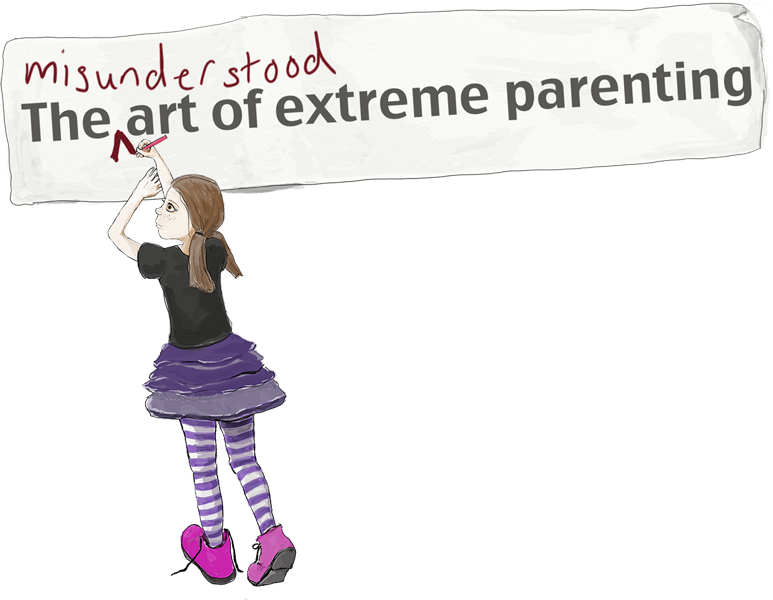
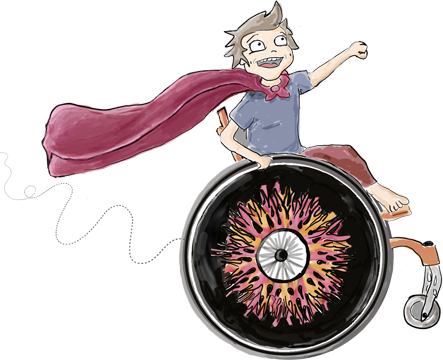
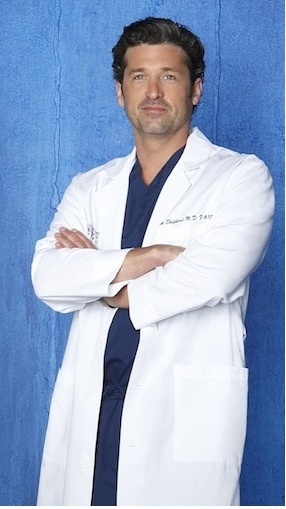
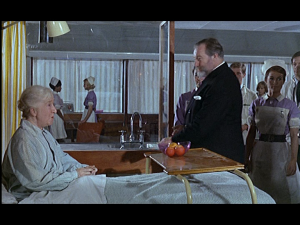
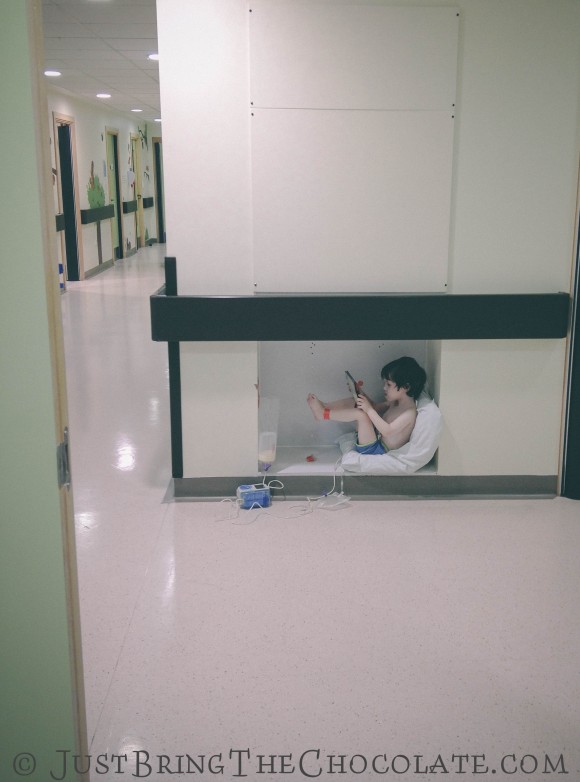
This should be compulsory reading for every medical student in every corner of the universe and a compulsory part of every member of the NHS’s CPD. And then it shared with every education professional with a ‘how can we apply this to how we work with families’ question added on the end.
I don’t think you’re mad, I think this is so true and brilliant x
Thank you Jenny, and you’ll be there as my body guard when they come for me with pitch forks and burning torches… right?! 😉
Bloody well done for writing this. Every single word needs displaying in every single paediatric doctor’s common room across the country. It can’t be shared enough, because too many people I care about are going through the similar, and I *never* want to go through the Hell we went through 5 years ago – because parents who want to advocate for their children in situations where doctors should know better are always viewed in a bad light.
I thought long and hard about writing it. Not because I am unsure if it needs to be said, but because I am concerned that the fall out from saying it publicly will have a negative impact on Dominic’s care. It is so easy for a parent to be surgically removed from the picture, just question whether or not some behaviour or other could be signs of something untoward going on and the ball starts rolling and everyone feels justified in ignoring what you say from then on. Most parents of complex (especially undiagnosed) children tick almost every box on the things to look out for. Apparently if you’re overly anxious it could indicate a concern, as could being unusually calm (!).
After what happened to you I grew up a lot and stopped assuming that the truth would be obvious and speak for itself. I photograph and document as much as I can and always get a witness to everything I can. It’s sad when you’re spending all your energy doing that rather than just feeling able to care for your child in the way you know best.
Thank you for writing and sharing this blog…… Much of it is true unfortunately and the key factor been ‘culture change’ and the knowledge that parent Carers do indeed know their child best – give them the opportunity and if there are parents out there who are not confident enough or battling so many appointments or general up to the hilt / then stop / and ask – what do they need?? It’s a simple question ……
That’s a very good point, there is a golden opportunity to pick up on parents that need more support. We can but dream, right?
Now Renata has always been an eloquent and somewhat formidable communicator.
But when she’s backed into a corner and starts rolling up her sleeves? Buy tickets.
There is nothing like throwing out fighting talk from the comfort of being behind a computer screen and on a sofa a million miles away from the hospital ward…
As ‘Welcome to Holland’ seems to be required reading for all newly diagnosed parents, this blog entry should be on the syllabus for all trainee health professionals of whatever variety and also on the programme for continuing professional development for those already qualified.
It has taken us a number of years and an awful lot of battling, together with the boost of having my dad who was a special needs school head for 30+ years before he retired and so had worked with many of the health professionals we deal with to get to the point where we are listened to and valued – I wish every parent had the quality of tem we have for our kids. I stil want to kill anyone who refers to me as ‘mum’ though!!!! – Helen X
Do you rent your dad out? Considering the overwhelming response I’ve had to this post, I would have thought that he’d be inundated with requests! On a more serious note, I’m really glad you’re being supported, lets just hope there isn’t any ‘restructuring’ within the departments!
Renata, you rock. This needed to be said, on behalf of thousands of parents across our country (and maybe even others?). You are intelligent, brave, strong and witty – a formidable mix 🙂 Doctors make mistakes. Sure, parents may also may mistakes, but they are likely to be far fewer, as, like you said, the parent/carer has the full picture, which is what you generally need to be able to make the best decision. No doctor has ever been taught EVERYTHING in med school. The NHS is like a huge oil tanker; will take ages to turn around. But we shouldn’t give up trying. Proud of you and your writing x
Thank you Steph. I’d like to say that it if changes one doctor’s attitude then I have succeeded, but in reality that’s rubbish. There needs to be a big culture change, and until patients and parents are brave enough to be honest, I can’t see it happening.
Great article, I think we all know the NHS is a great service BUT things need to change. IMHO the NHS would save stacks of cash if patients were listened to more often. I hope the campaign shows that enough people on the inside of the system want improvements.
I agree Vanessa. The amount of time that is wasted is unbelievable. And that adds up to thousands of pounds when it’s time wasted in a hospital bed in a specialist hospital.
I just wanted to thank you for writing something as a patient not listened to. Doctors assume at times too much rather than to look/scan/discuss other possibilities. As an in-patient my biggest hate was being referred to as ‘Mrs’…I’m not married so am a ‘Miss’ if you continue to use my surname to greet me then at least get it right. It is just pure laziness to address all female adult patients as ‘Mrs’! Also a previous history doesn’t define the symptoms you are now seeing. I too hope this is read by those who need to and applaud those who csn sit back and say that wasn’t me.
Thanks for taking the time to comment Alison. Next time you’re admitted, take a white board pen and when they write ‘Mrs’ above your bed, rub it out and write Alison 😉
Great post. We only see outpatient departments with my kids but even then I have experienced some of this at times and it’s definitely frustrating.
When you come across drs and professionals who do respect and appreciate that you have knowledge about your child and their condition and are willing to take that on board and treat you as an equal with your child’s care, that is a so much more beneficial environment for everyone involved, and it’s sad that its not the case in all hospitals and departments and that posts like this have to be written!
Wishing all the best to you and Dominic
It also makes the parents trust the doctor, which leads to better compliance. It’s win-win!
Fabulous post and the NHS Doctors and Nurses who do embrace the “Mother’s” knowledge are often worth hugging and I do so. They should be the majority instead of the minority. Go You!!! xxx
Liska, I wholeheartedly agree. I hate having to highlight the failures, as generally speaking those people that you are trying to reach get so angry at the criticism that their ears clamp shut. I would far, far, far rather find a way to celebrate what works, focus on the doctors who respect their patients and show other health care practitioners what they should be aiming for.
Hi I have just sent a link to my daughter who is a first year medical student. Hopefully she will remember this when training on the wards and once a qualified Dr, that being listened to and that the parent has a name and is the best advocate for their child.
Brilliant, I’d be very interested to know what she thinks. Thanks Sue x
Excellent, so well written and rings so true of our GOS experience this week. We told the team that our son was sensitive to anesthetic but did they listen, of course not, 2 hours into recovery they still couldn’t wake him up. Equally so well observed the kitchen interaction with the other parents, us all with gritted teeth telling each other how much we hated the place a little more everytime we came, because no one would bloody well listen to us.
I must say working in adult rehabilitation that this post could equally well apply to those caring for someone with a chronic neurological disorder in the adult services as well.
It’s so sad isn’t it. There are some truly brilliant doctors and nurses in that place but where they let themselves down is with the frequent fliers, who rely on good communication to ensure that everyone can work together towards the best solution for the child. The PR is so good, I think sometimes that one of the biggest problems is that they believe their own hype so much that they don’t keep asking whether they are actually putting the child first
I think your post goes a long way, and it may seem to be an eye opener to most Doctors and Health care practitioners. Legally speaking, if we are to be patients, we are entitled to speak-up and for the doctor to acknowledge our whereabouts. I’m saying this not because I want to degrade their expertise or something, but what I’m trying to point is I think getting that right for us patients should be firmly addressed.
True, it has to be patient centred as it is, after all, about treating a patient!
Agree! After all treatments made are supposedly that way. We are not trying to give them a bad mouth but this is already reality that speaks to everyone. I think what they need to develop more is their “Empathic” skills. In that way, they get to realize what they patient “REALLY FEEL” inside and not base on the things that they just verbalize.
LOVE this blog.
now trying to find where to follow on WordPress…
Hx